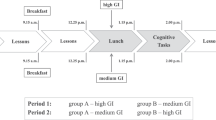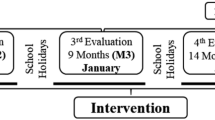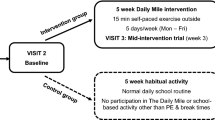Abstract
Background/Objectives:
Considering the large number of children worldwide attending all-day schools, information on the effects of lunch on short-term cognitive performance is of public health relevance. However, only adult studies investigated this issue yet. Therefore, this study examined the impact of skipping lunch vs having lunch on children’s cognitive functioning in the early afternoon.
Subjects/Methods:
Participants in this randomized crossover study with two groups were healthy 6th grade students of an all-day school in Gelsenkirchen, Germany. Group 1 skipped lunch on study day 1 and received an ad libitum lunch 1 week later on study day 2. The order for group 2 was vice versa. In the afternoon tonic alertness, visuospatial memory and selective attention were determined using a computerized test battery of the Vienna Test System. For continuous and discrete interval-scaled variables, treatment effect was estimated using the two sample t-test or the Wilcoxon rank-sum test, for discrete ordinal-scaled variables using generalized linear models.
Results:
Data on 105 children (48% male; 12.6±0.6 years) were analyzed. Except for tonic alertness there were no significant differences in cognitive functioning between the skipping lunch day and the having lunch day. The higher number of omission errors on the skipping lunch day lost significance when adjusting for multiple testing.
Conclusions:
In the first study on this topic lunch did not have relevant effects on children’s cognitive functioning in the early afternoon. Future research needs to be done to figure out potential methodical and physiological explanations.
This is a preview of subscription content, access via your institution
Access options
Subscribe to this journal
Receive 12 print issues and online access
$259.00 per year
only $21.58 per issue
Buy this article
- Purchase on Springer Link
- Instant access to full article PDF
Prices may be subject to local taxes which are calculated during checkout


Similar content being viewed by others
References
Ralston K, Newman C, Clauson A, Guthrie J, Buzby J . The National School Lunch Program: Background, Trends, and Issues. Econ Res Serv 2008;; 61: 1–48.
Food and Nutrition Service (FNS) USDA. Nutrition standards in the national school lunch and school breakfast programs. Fed Regist 2012; 77: 4088–4167.
WHO. Food and nutrition policy for schools–A tool for the development of school nutrition programmes in the European region. World Health Organization Regional Office for Europe: Copenhagen, 1–58 2006.
Heindl I . Is there a healthy school meal? In: Eating at school–Making healthy choices. Council of Europe: Strasbourg, 2003, pp 63–70.
ZMP Marktstudie–Schulverpflegung an Ganztagsschulen. Zentrale Markt- und Preisberichtstelle für Erzeugnisse der Land-, Forst- und Ernährungswirtschaft GmbH: Bonn, 2005, pp 1–111.
Würbach A, Zellner K, Kromeyer-Hauschild K . Meal patterns among children and adolescents and their associations with weight status and parental characteristics. Public Health Nutr 2009; 12: 1115–1121.
Pollitt E, Leibel RL, Greenfield D . Brief fasting, stress, and cognition in children. Am J Clin Nutr 1981; 34: 1526–1533.
Dickie NH, Bender AE . Breakfast and performance in school children. Br J Nutr 1982; 48: 483–496.
Vaisman N, Voet H, Akivis A, Vakil E . Effect of breakfast timing on the cognitive functions of elementary school students. Arch Pediatr Adolesc Med 1996; 150: 1089–1092.
Hoyland A, Dye L, Lawton CL . A systematic review of the effect of breakfast on the cognitive performance of children and adolescents. Nutr Res Rev 2009; 22: 220–243.
Spring B, Maller O, Wurtman J, Digman L, Cozolino L . Effects of protein and carbohydrate meals on mood and performance: interactions with sex and age. J Psychiatr Res 1982; 17: 155–167.
Craig A, Baer K, Diekmann A . The effects of lunch on sensory-perceptual functioning in man. Int Arch Occup Environ Health 1981; 49: 105–114.
Smith AP, Miles C . Effects of lunch on selective and sustained attention. Neuropsychobiology 1986a; 16: 117–120.
Smith AP, Miles C . The effects of lunch on cognitive vigilance tasks. Ergonomics 1986b; 29: 1251–1261.
Zimmermann P, Leclercq M . Neuropsychological aspects of attentional functions and disturbances. In: Leclercq M, Zimmermann P (eds) Applied neuropsychology of attention. Theory, diagnosis and rehabilitation 1st edn. Psychology Press: London, UK. pp 56–86 2002.
Wager TD, Smith EE . Neuroimaging studies of working memory: a meta-analysis. Cogn Affect Behav Neurosci 2003; 3: 255–274.
Senn SJ Cross-over Trials in Clinical Research 1st edn. John Wiley & Sons Ltd.: Chichester, UK, 1993.
Golley R, Baines E, Bassett P, Wood L, Pearce J, Nelson M . School lunch and learning behaviour in primary schools: an intervention study. Eur J Clin Nutr 2010; 64: 1280–1288.
Storey HC, Pearce J, Ashfield-Watt PA, Wood L, Baines E, Nelson M . A Randomized controlled trial of the effect of school food and dining room modifications on classroom behaviour in secondary school children. Eur J Clin Nutr 2011; 65: 32–38.
Smith AP, Leekam S, Ralph A, McNeill G . The influence of meal composition on post-lunch changes in performance efficiency and mood. Appetite 1988; 10: 195–203.
Craig A, Richardson E . Effects of experimental and habitual lunch-size on performance, arousal, hunger and mood. Int Arch Occup Environ Health 1989; 61: 313–319.
Smith AP, Ralph A, McNeill G . Influences of meal size on post-lunch changes in performance efficiency, mood, and cardiovascular function. Appetite 1991; 16: 85–91.
Lloyd HM, Green MW, Rogers PJ . Mood and cognitive performance effects of isocaloric lunches differing in fat and carbohydrate content. Physiol Behav 1994; 56: 51–57.
Smith A, Kendrick A, Maben A, Salmon J . Effects of fat content, weight, and acceptability of the meal on postlunch changes in mood, performance, and cardiovascular function. Physiol Behav 1994; 55: 417–422.
Wells AS, Read NW . Influences of fat, energy, and time of day on mood and performance. Physiol Behav 1996; 59: 1069–1076.
Kanarek R . Psychological effects of snacks and altered meal frequency. Br J Nutr 1997; 77: 105–118.
Follenius M, Brandenberger G, Hietter B . Diurnal cortisol peaks and their relationships to meals. J Clin Endocrinol Metab 1982; 55: 757–761.
Epstein HT . Stages in human brain development. Brain Res 1986; 395: 114–119.
Chugani HT, Phelps ME, Mazziotta JC . Positron emission tomography study of human brain functional development. Ann Neurol 1987; 22: 487–497.
Leigh GE, Green MW . Nutritional influences on cognitive function: mechanisms of susceptibility. Nutr Res Rev 2002; 15: 169–206.
Mahoney CR, Taylor HA, Kanarek RB, Samuel P . Effect of breakfast composition on cognitive processes in elementary school children. Physiol Behav 2005; 85: 635–645.
Widenhorn-Müller K, Hille K, Klenk J, Weiland U . Influence of having breakfast on cognitive performance and mood in 13- to 20-year-old high school students: results of a crossover trial. Pediatrics 2008; 122: 279–284.
Van Zomeren AH, Brouwer WH . Head injury and concepts of attention. In: Levin HS, Grafmann J, Eisenberg HM (eds). Neurobehavioral recovery from head injury 1st edn. Oxford University Press: New York, USA. pp 388–415 1987.
Acknowledgements
This study was supported by a grant from the Uniscientia Foundation, Vaduz. Thanks to the children, the teachers and the kitchen staff for their participation and cooperation in the CogniDO study. The authors would also like to acknowledge the dedicated field work staff of the CogniDO study. Particular thanks to Professor Dr Axel Schölmerich (Department of Developmental Psychology, Ruhr University Bochum) for valuable comments, to Evgenia Freis (Faculty of Statistics, TU Dortmund University) for statistical consulting during the study planning and to Bernhard Scheffel (PsyExpert e.K., Mannheim, Germany) for advice on application and evaluation of the test battery. The Cognition Intervention Study Dortmund (CogniDO) is registered on clinicaltrials.gov (NCT01401153).
Author information
Authors and Affiliations
Corresponding author
Ethics declarations
Competing interests
The authors declare no conflict of interest.
Rights and permissions
About this article
Cite this article
Müller, K., Libuda, L., Gawehn, N. et al. Effects of lunch on children’s short-term cognitive functioning: a randomized crossover study. Eur J Clin Nutr 67, 185–189 (2013). https://doi.org/10.1038/ejcn.2012.209
Received:
Revised:
Accepted:
Published:
Issue Date:
DOI: https://doi.org/10.1038/ejcn.2012.209
Keywords
This article is cited by
-
Impact of lunch with carbohydrates differing in glycemic index on children's cognitive functioning in the late postprandial phase: a randomized crossover study
European Journal of Nutrition (2022)
-
Kognition: Einflüsse von Essen, Trinken und Bewegung
Monatsschrift Kinderheilkunde (2022)
-
Short-term effects of carbohydrates differing in glycemic index (GI) consumed at lunch on children’s cognitive function in a randomized crossover study
European Journal of Clinical Nutrition (2020)
-
Einfluss von Ernährung auf die Kognition
Pädiatrie (2019)
-
Perspektiven in der Kinderernährung
Monatsschrift Kinderheilkunde (2014)



